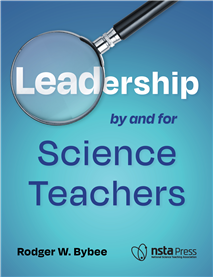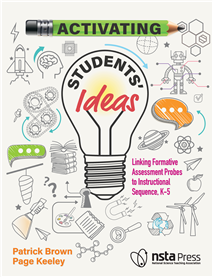All Preservice Science Education resources
Journal Article
To transition introductory college science courses from large, passive lectures to more student-centered learning environments, additional instructional support is needed. Peer learning assistants (PLAs) can support that transformation by engaging st...
By Brittney A. Ferrari, Jonathan A. Dees, Norris A. Armstrong, and Julie M. Kittleson
NSTA Press Book
Leadership by and for Science Teachers
Imagine having the opportunity to hear from 21 colleagues about their personal leadership journeys—and to get their advice. Leadership by and for Science Teachers is just such an opportunity. Author Rodger Bybee provides the insights and inspiratio...
By Rodger Bybee
Journal Article
Graduate teaching assistants (TAs) may identify with multiple roles during their introductory biology teaching experiences. This study developed an instrument that measures TA role identity in introductory biology. Initial development and content val...
By Amy E. Kulesza and Dorinda J. Gallant
Journal Article
Facilitating Departmental and Institutional Change for Expanding Undergraduate Research Experiences
Increased sustainable access to undergraduate research opportunities, particularly for historically underrepresented populations, involves transforming departmental and institutional cultures, which is time-consuming and expensive. Competing universi...
By Rebecca Friesen and Adriana Cimetta
Journal Article
Overcoming Obstacles and Finding Support for Teaching Critical Thinking in STEM
This qualitative research study aimed to discover what obstacles and supports community college teachers in science, technology, engineering, and mathematics (STEM) face when teaching critical-thinking skills in their courses. The research was conduc...
By Christa Evangelisto
Journal Article
Using Popular Fiction to Inspire Scientific Inquiry
Many teacher educator preparation programs do not provide opportunities for preservice teachers (PSTs) to experience and examine the use of popular fiction as a connection point to science teaching. This study explores a unit designed to support PSTs...
By Kristin Cook and Winn Wheeler
Journal Article
In response to the demand for more STEM-certified teachers, identity has emerged as a theoretical lens for examining how candidates can be recruited into and retained in the teaching profession. This study explores the intersection between teaching i...
By Ingelise Giles, Nicole Cook, Zahra Hazari, Maria Fernandez, and Laird Kramer
Journal Article
Issues of Question Equivalence in Online Exam Pools
During the pandemic, the use of question pools for online testing was recommended to mitigate cheating, exposing multitudes of science, technology, engineering, and mathematics (STEM) students across the globe to this practice. Yet instructors may be...
By Cody Goolsby-Cole, Sarah M. Bass, Liz Stanwyck, Sarah Leupen, Tara S. Carpenter, and Linda C. Hodges
Journal Article
By Laura Robertson, Alissa Lange, Jamie Price, Andrea Lowery, Holly McAvoy Scott, Qiuju Tian, and Ryan Nivens
NSTA Press Book
Activating Students' Ideas: Linking Formative Assessment Probes to Instructional Sequence, K-5
Science teachers face an incredible challenging task of combining research on how students learn best, the three-dimensions of the Science Education Frameworks that in themselves are complicated to understand, and instructional sequences that lead to...
By Patrick Brown, Page Keeley
Journal Article
How Do Students Interact With the Primary Scientific Literature in an Undergraduate Science Program?
The ability to read, understand, and interpret primary scientific literature is an essential skill for undergraduate students in science. This study aimed to provide a detailed understanding of how second- and third-year undergraduate students in a...
By Yi Hou, Heather Verkade, Jan van Driel
Journal Article
Preservice Teachers’ Meaningful Science Learning
This article describes how preservice elementary teachers learn about the nature of science and develop scientific literacy through a collaborative project that prepares them to design meaningful learning experiences for students. The Life’s Repl...
By Lizzette M. Velázquez Rivera and Isaris R. Quiñones Pérez
Journal Article
The Role of Question-Asking in Mentoring Undergraduate Research
Undergraduate research is a high-impact educational practice for which effective mentoring has been identified as a key factor in determining its success. Some researchers have argued that effective mentors help increase students’ independence an...
By Sara L. Johnson and George M. Bodner



